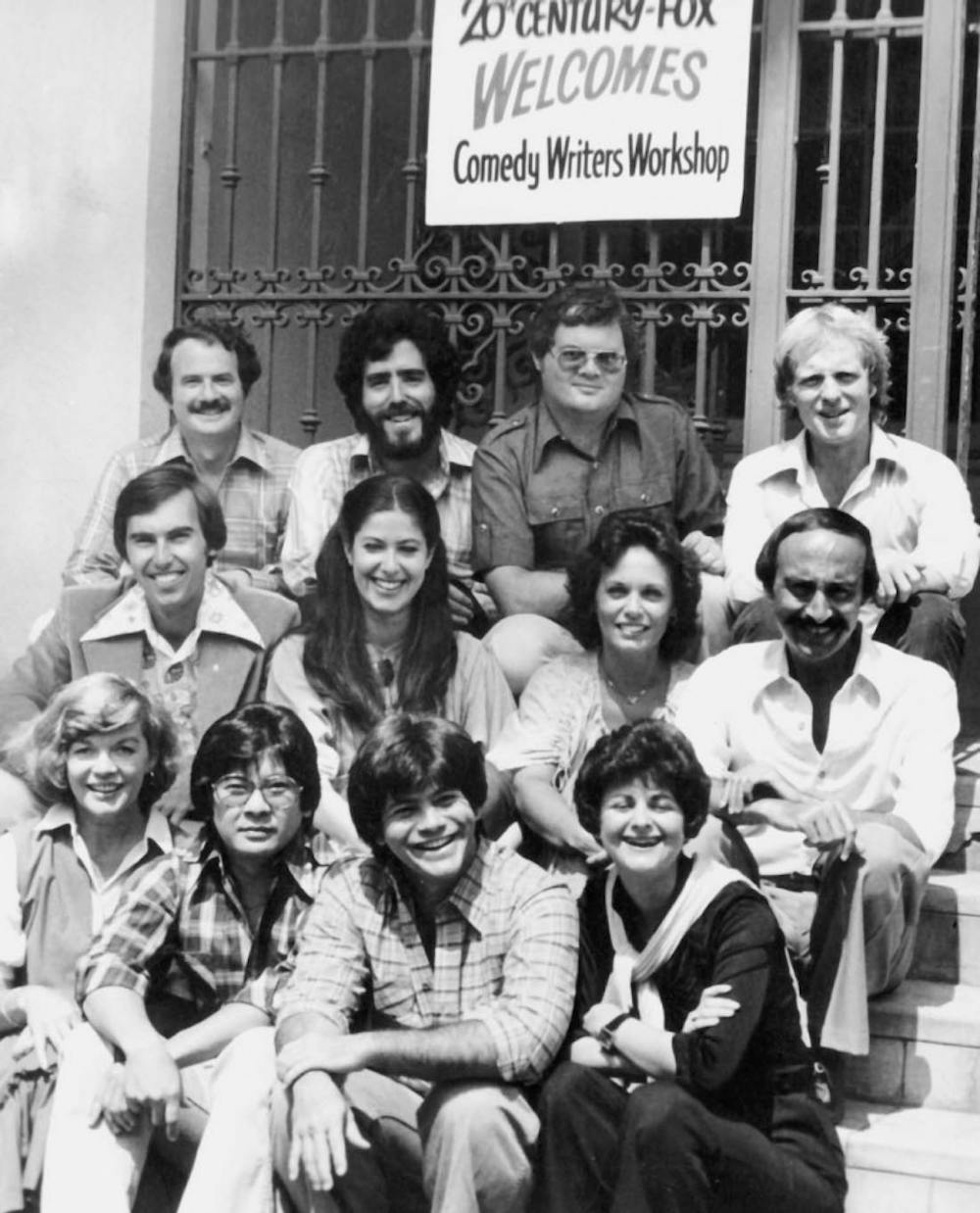
Second row, first from left Stephen MacCarthy is seen here with other winners of the writing contest that was sponsored by FOX in 1978.
Credit: Courtesy of Stephen MacCarthyWhen students think of comedy, the first thing to come to mind may be Mask & Wig or Bloomers, but not a Penn administrator.
They may be surprised, then, to learn about Penn’s Vice President for University Communications Stephen MacCarthy’s past as a Hollywood comedy writer.
MacCarthy, who took his position at the beginning of the 2011-12 academic year, started his writing career very early on. His interest in writing had bloomed early, when he won a national UNICEF essay contest in fifth grade, but his big break came years later when he was working at a television station and a friend urged him to apply for a national writing contest sponsored by 20th Century Fox.
MacCarthy entered the contest thinking it could be a stepping stone to his eventual goal of being a film director. He ended up as one of 10 winners out of over 5000 submissions.
The bright, glitzy lights of Hollywood
During the years MacCarthy actively wrote in Hollywood between 1978-81, he says he had a “modicum of success.” After his win in the contest, MacCarthy was partnered with Paul Taylor, another writer, and they were signed to 20th Century Fox. Together, they sold multiple pilots, wrote a story for M*A*S*H and had frequent meetings with networks.
“I had a partner who was really funny. We were good as a team because he would come up with crazy ideas and I could filter what he was doing,” he said. “It was a good combination in all the ways.”
Taylor fondly recounted a time when the two went in to pitch stories, and they had gone through their whole list of detailed pitches to no avail. As a result, they ended up improvising a story on the spot and went back and forth building on the story. The improvised pitch eventually was made into a M*A*S*H episode.
“We would meet and talk and goof off a lot. Since we didn’t have an office, and it was depressing to work in your own home, we’d go to UCLA and go to a classroom that wasn’t in use until someone kicked us out,” Taylor said.
Leaving Hollywood behind
Though he enjoyed his budding career and its glamour, MacCarthy said he eventually realized the instability of a career in Hollywood.
“It was pretty clear that it was a very difficult business because there are a lot of people with an enormous amount of talent who don’t work [on projects],” he said. “I would see colleagues who I thought were smarter and had greater talent than I did who hadn’t worked in years.”
In addition, the pervasive drug use at the time alienated the duo and made it more difficult to collaborate with others, according to MacCarthy. He recounted a time when CBS asked for major revisions to a script within a week’s timeframe and the others at the office spent a whole day sniffing cocaine and debating what car the main character should ride.
Taylor said, “We both joke that if we had kept all the coke we turned down, we would have our retirement fund down.”
MacCarthy also felt that he couldn’t keep up with the Hollywood lifestyle.
“Part of the problem was that it wasn’t just about writing, but connections. They were out partying in the right places, having lunch in the right places and in some instances, doing drugs with people in the right places,” MacCarthy said. “I stayed home and I was writing stuff all the time which was actually not the best way to advance your career in Hollywood in those days.”
In 1981, MacCarthy moved on to work as the creative director of an advertising agency, working as a press secretary and speechwriter for one of his political clients. He then took advantage of an opening as the speechwriter for the Chancellor for the California State University system and moved up the ranks there. He has since then worked in communications at Penn State University and the University of Arizona.
A unique voice at Penn
President Amy Gutmann said MacCarthy’s past brings something different to the table.
“I think Steve’s varied background is a great asset to his understanding of communications in a university setting because we’re full of untraditional people,” she said. “I look for people who bring a combination of great expertise and something different to offer. Because we’re an academic community, we love new ideas.”
Associate Vice President for University Communications Phyllis Holtzman said MacCarthy’s start as a comedy writer, as well as his years in higher education, come through in his work at the office. Holtzman said that his past enables him to think broadly and understand how to communicate ideas to a broad audience.
“He is very open-minded and flexible and he really wants your ideas,” she said. “I just have this image of comedy writers sitting around in a room tossing ideas back and forth, and that’s something he likes to do [at the office].”
The challenges he faced in Hollywood proved to be useful lessons, according to MacCarthy. He said his writing background has helped him craft Penn’s story, and that Hollywood has taught him people skills.
“Hollywood probably has the single largest concentration of big egos in the world,” he said. “If you can handle a psychotic, egomaniacal television producer, any other interactions you are going to have in your career are a walk in the park by comparison.”
Though he has seen some fellow contest winners make it big, such as Debra Frank, who was nominated for an Emmy for the TV show “Moonlighting,” he appreciates higher education all the more because of his background.
“I’m not an academic but because of that in some ways, I have more appreciation and respect for what academics do,” he said. “I feel like I’m the luckiest person to have ended up in higher education.”
The Daily Pennsylvanian is an independent, student-run newspaper. Please consider making a donation to support the coverage that shapes the University. Your generosity ensures a future of strong journalism at Penn.
DonatePlease note All comments are eligible for publication in The Daily Pennsylvanian.








